Whether you’re a caffeine fiend or not, you’ve probably seen or considered one of these beverages.
The use of caffeine pills, which have been demonstrated to provide long-lasting energy, has grown in popularity in recent years. It’s hard to say which is better.
But when you think about it, you may get the same effect much more quickly by taking caffeine pills than energy drinks. In fact, more convenient, since it’s simpler to take numerous pills than to drink multiple energy drinks to get the same level of energy as you would from the latter.
To put it simply, caffeine pills offer a cheaper and hassle-free alternative to coffee and energy drinks, but the real million-dollar question is how they stack up.
In this article, I will compare caffeine pills to energy drinks and coffee, as well as answer the main questions that people have about caffeine pills.
What are caffeine pills?
Caffeine pills, as the name suggests, are pills that contain (almost) pure caffeine.
Moreover, they are available in small boxes of 16 tablets that can be swallowed with some water, just like any other pill that you might take.
Not to mention, the pills that I road-tested in researching this article, Vivarin, contain 200mg of caffeine and 65mg of calcium per pill.
There are also other “inactive ingredients” listed on the packaging, but the exact amount of those other ingredients are not specified namely:
- Carnauba Wax
- Colloidal Silicon Dioxide
- Corn Starch
- Croscarmellose Sodium
- D&C Yellow #10 Aluminium Lake
- Dicalcium Phosphate Dihydrate
- FD&C Yellow #6 Aluminium Lake
- Hypromellose
- Magnesium Stearate
- Microcrystalline Cellulose
- Polyethylene Glycol
- Polysorbate 80
- Titanium Dioxide
Phew… what a mouthful!
If some of those ingredients don’t sound natural or healthy, that’s because they’re not.
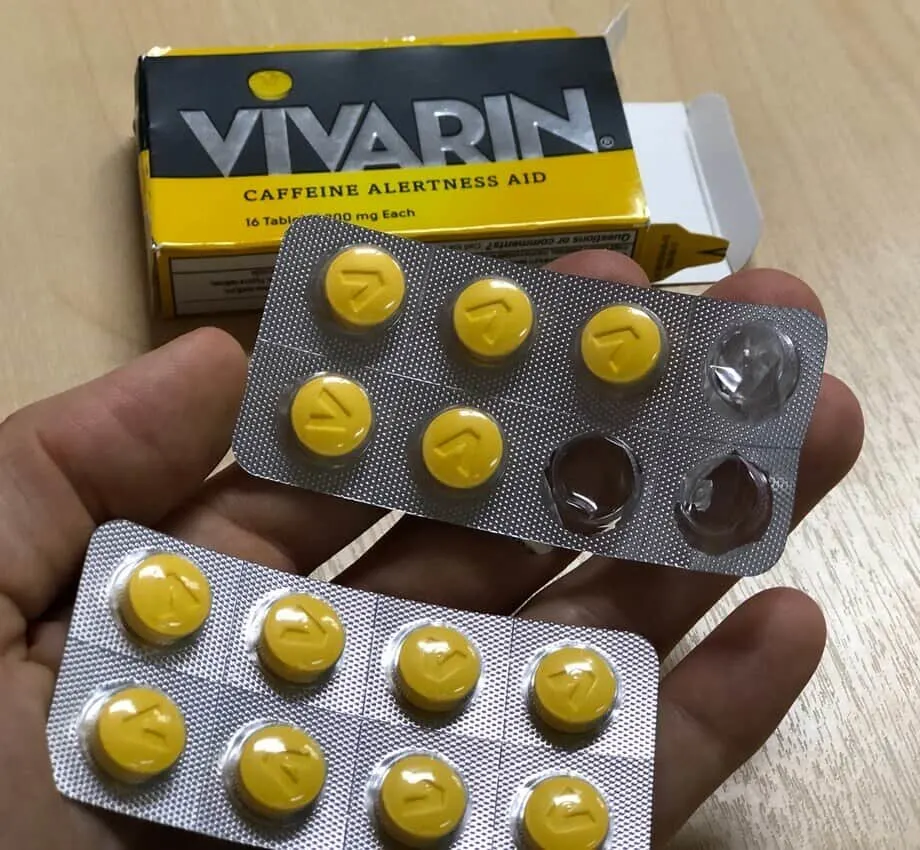
How much caffeine is in a caffeine pill?
Each Vivarin pill contains 200mg of caffeine.
Come to think of it, that’s around twice as much as you would get in a regular cup of Joe, or 2.5 times as much as you would get in an 8.4-ounce Red Bull.
Are caffeine pills bad?
The short answer is no, caffeine pills are not bad for you.
But there are a few caveats to that.
Firstly, as with anything containing caffeine, if you have a pre-existing heart condition or are sensitive to caffeine for other reasons, then you should avoid caffeine from any source, as usual.
Secondly, caffeine pills do contain a lot of caffeine, so you want to exercise some caution in how many you take in any given time frame.
Numerous studies and health agencies recommend no more than 400mg of caffeine per day for a healthy adult. Just two Vivarin pills will get you to that limit, and it’s highly advisable not to have them too close together.
Now is probably a good time to remind you to always be sensible with your caffeine consumption to avoid any side effects from too much of a good thing.
Next, you should probably do your own research on the other ingredients that are included alongside caffeine. Part of the problem with that is that the brands that make caffeine pills aren’t very transparent about how much of some of the other ingredients are included.
For sure, some of the inactive ingredients in Vivarin should raise some eyebrows and lead us to at least pause and ask a few questions. But, we just don’t know how many of these ingredients are actually included in the recipe.
Lastly, caffeine can cause mild dehydration, which is something else you need to be aware of if you plan to take caffeine pills. More on that later…
Caffeine Pills vs Energy Drinks
The pros of caffeine pills versus energy drinks are:
- price
- ease of consumption
- convenience of packaging
The cons of caffeine pills when compared to energy drinks are:
- the effects
- the added “inactive ingredients”
- how enjoyable they are to consume
- taste
Energy drinks typically contain anywhere between 50 to 300mg of caffeine per serving.
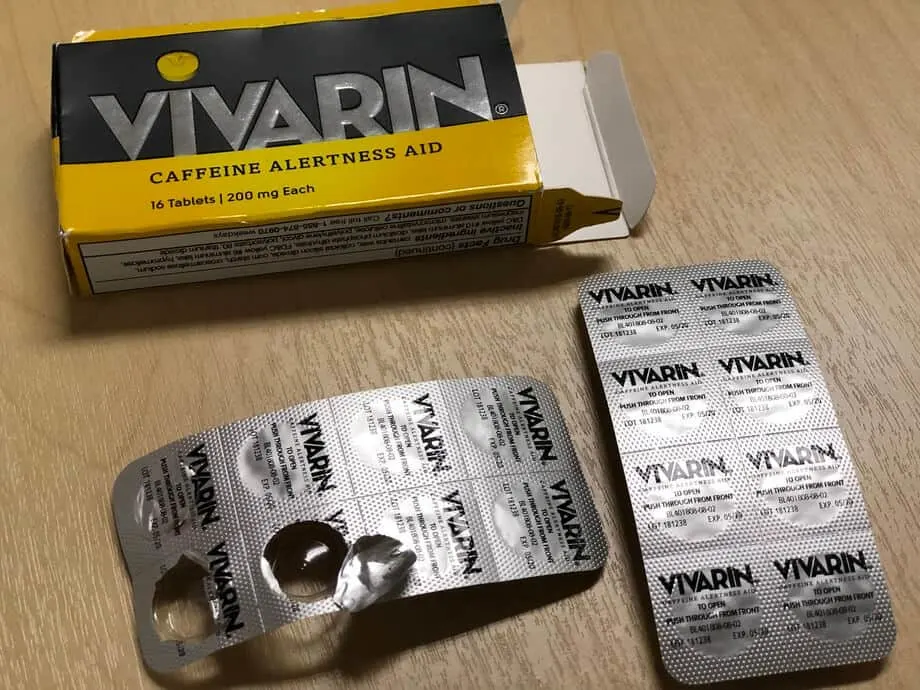
Caffeine Pills vs Energy Drinks (Pros)
Caffeine pills win on price, but what good is that if they don’t give you anywhere near the same boost as you would get from an energy drink?
In fact, caffeine pills work out to be somewhere around $0.60 per pill by the time you factor in shipping. That’s considerably cheaper than most energy drinks, which average anywhere in the $2-$3 range with a few cheaper and more expensive options.
However, caffeine pills aren’t much cheaper than REIZE Energy Drink which comes to around $1 per drink with shipping.
It’s certainly faster to simply swallow a pill than it is to chug a can, so that’s another win for caffeine pills. It’s also easier and more convenient to carry a bunch of them around in your pocket. Energy drink cans are quite big and bulky.
But hey, that’s just another great thing about powder energy drinks, including REIZE. Instead of carrying a can, you only need to carry a small sachet around the size of a credit card and you can make your energy drink fresh whenever you want.
Caffeine Pills vs Energy Drinks (Cons)
The list of “inactive ingredients” in Vivarin caffeine pills is pretty scary once you start doing a little digging into what each of the ingredients actually does. Several of them have been linked to cancer, something that I’m not terribly keen to acquire.
Lastly, there’s no denying that an energy drink is just a more enjoyable experience and clearly tastes much better than simply downing a pill with a few ounces of water.
If you haven’t found an energy drink that you think tastes good yet, then you need to keep looking because they are definitely out there.
Caffeine Pills vs Coffee
All of the same pros and cons apply when comparing caffeine pills to coffee, so I won’t rehash them here.
Despite containing about twice as much caffeine as you can expect to get in a regular Joe, caffeine pills don’t deliver anywhere near the energy boost that you would get from a coffee (in my experience).
One great thing about coffee is that the consumer has a lot of control over what they add to their blend. Creamers and sugar can make the proposition considerably less healthy. Of course, if you go without those things it will also taste worse too.
Personally, if given the choice between having a coffee, energy drink, or caffeine pill the pill would be the last thing that I would choose.
Despite the lower price tag, the negatives mean that the other options are far better in my opinion.
If you’re curious about how coffee and energy drinks compare, check out my article on that.
To learn more about the differences between caffeine pills and coffee, watch the video below!
Popular Brands of Caffeine Pills
There are quite a few brands competing for a slice of the caffeine pill pie, including:
- Vivarin
- ProLab
- Nutricost
- Focused Energy
- Smartervitamins
- Fused Focus
- Zhou Supplements
- Genius
- Natrol High
- Best Naturals
- NoDoz
- Elite
- Vali
What are the side effects of caffeine pills?
Like anything containing caffeine, too much of a good thing can cause problems like:
- increased thirst
- dizziness
- insomnia
- diarrhea
- headache
- fever
- irritability
Do caffeine pills help you lose weight?
Caffeine pills alone will not help you to lose weight.
However, there have been many studies showing that consuming caffeine in combination with exercise can help you to burn more calories than doing exercise without consuming caffeine.
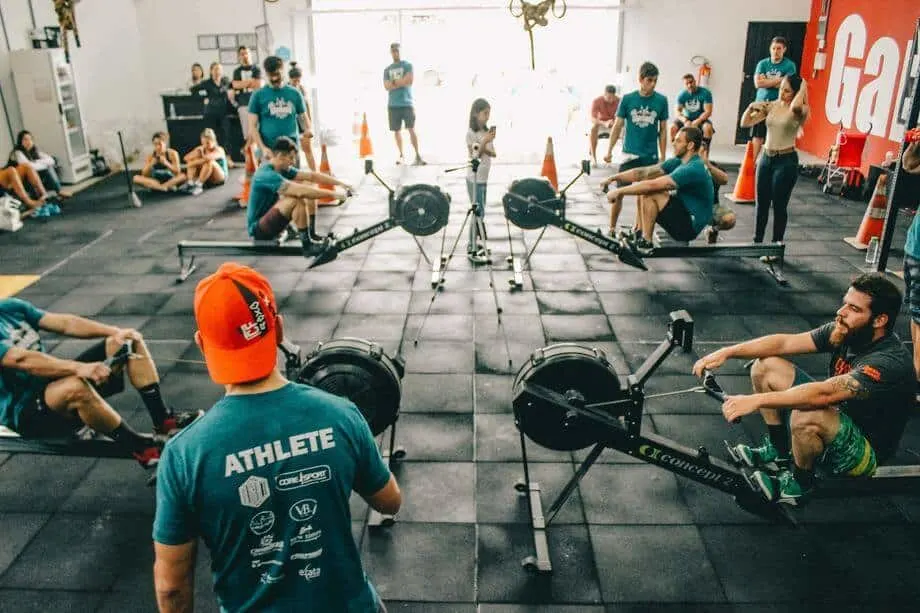
Do caffeine pills dehydrate you?
Yes, caffeine pills increase the risk of dehydration.
In my opinion, the risk of dehydration is the most dangerous thing about consuming a moderate amount of caffeine. That’s just one of the many reasons that I prefer to drink my caffeine instead of swallowing it in a pill.
If you drink it, you are getting some fluids at the same time as the caffeine which will help guard against dehydration.
Do caffeine pills actually work?
In my experience? Not really.
I was really disappointed in my test drive of caffeine pills, especially in light of the fact that each pill contains 200mg of caffeine.
Honestly, I felt a slight buzz for about 15 minutes and that was it. 2 hours later I was yawning and 3 hours later I had a nap because I couldn’t pull myself through the afternoon slump.
How long does a caffeine pill last?
In theory, caffeine should kick in after about 20 minutes of consumption and last for 3-6 hours, varying a bit from person to person.
But for me, I felt a small increase in energy and alertness for about 15 minutes, and then I wasn’t sure if I felt any different before I took the pill.
How many caffeine pills can I take a day?
The US FDA has cited 400mg of caffeine as a safe limit for healthy adults, but they note that there is a fair amount of variation in this.
As each pill contains 200mg of caffeine, that means that 2 pills in a day would get you to that 400mg threshold.
The Vivarin packaging itself says to wait at least 3-4 hours before consuming another pill.
How much caffeine does it take to kill you?
While there have been deaths attributed to caffeine consumption, they are quite rare.
It’s generally thought that the lethal dose of caffeine is 200mg per kilogram of body weight.
That means that a 180-pound man would need to consume around 16,363mg of caffeine.
That’s a lot!
To put that in perspective, that’s the amount of caffeine that you would get in 204 cans of Red Bull or around 160 cups of regular coffee.
You are more likely to die from your partner killing you for spending so much money on caffeinated drinks than you are to actually overdose yourself.
However, as usual, people who have pre-existing health conditions or who are sensitive to caffeine for other reasons should exercise care and talk to their health professionals.
| Age | Recommended Daily Caffeine Intake |
| Teenagers | 100 mg per day |
| Average Adults | 400 mg per day |
Caffeine Pills for Studying
Caffeine has been shown to have a bunch of positive cognitive effects, which is the main reason that students love it so much around exam time. But, be careful not to overdo it.
Remember that caffeine is caffeine, regardless of the source. So, if the caffeine you consume comes from a natural ingredient, it will still affect you in the same way as caffeine that is synthetically produced.
Caffeine can help you to stay alert for longer and get through an all-nighter, but usually, it’s best to plan to get a good night’s sleep instead of pulling an all-nighter if you can help it.
Remember that caffeine is not a substitute for sleep and eventually you will need a night of good sleep to rest and rejuvenate.
On the other hand, if you want to know more about the best energy drinks for an all-nighter check out this article I wrote.
Best Caffeine Pills
I have only tried Vivarin pills and I wasn’t overly impressed with the effects.
All of the brands that I mentioned above are available on Amazon. I’ve scanned through all of them to find out which brand had the best reviews overall.
The winner is…
Smarter Vitamins with a customer rating of 4.6 out of 5.
NoDoz and Vivarin were hot on their heels.
I don’t agree with that rating for Vivarin, but clearly, other people had a positive experience.
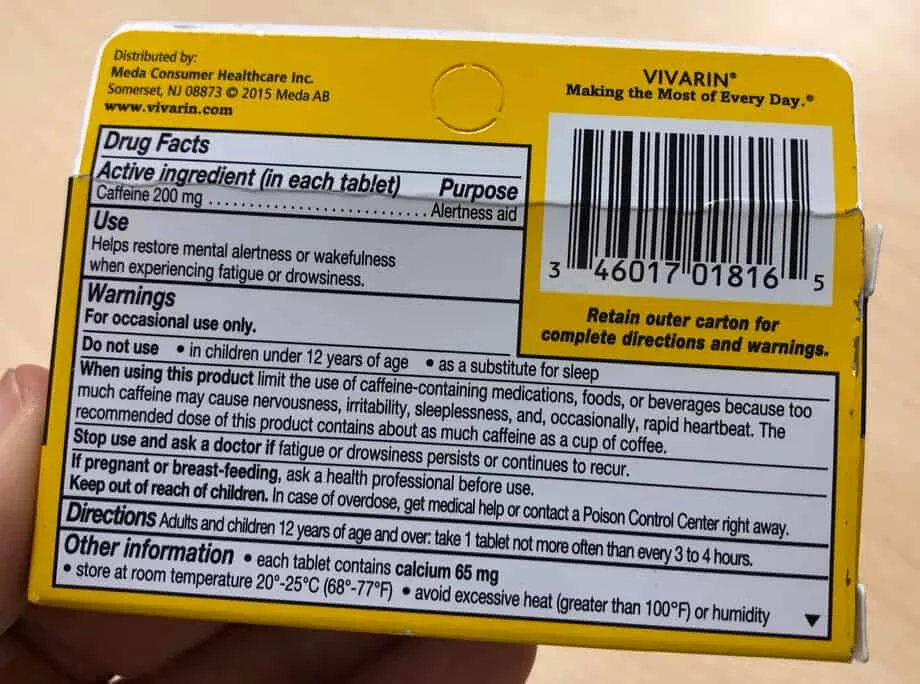
Natural Caffeine Pills
Some caffeine pills might market themselves as natural, but they all contain synthetic ingredients.
The reference to “natural” ingredients mostly refers to the source of caffeine.
But again, remember that caffeine is caffeine, regardless of the source. Natural or synthetic, it affects the body in the same way. One is not healthier than the other.
The additional ingredients used in caffeine pills have been linked to a wide range of serious health problems, as already mentioned.
Vivarin Caffeine Pills Review
I would say that the energy boost that I got from taking a caffeine pill was very underwhelming, and frankly, quite disappointing.
To give you a little context about my caffeine sensitivity, I drink caffeine every day. Sometimes only a little, sometimes 2-3 caffeinated drinks in a day.
Whether it’s energy drinks, coffee, tea, or some combination of them, I’ve made caffeine part of my daily routine and I absolutely love it.
So, I was excited to try caffeine pills to see how they compare to energy drinks or coffee.
I was a little bit concerned that 200mg of caffeine in the single pill might be a little bit too much, and after taking my pill together with my girlfriend who also took a full pill at 12:30 pm I was bracing myself for what I thought might have been an overpowering and overwhelming kick.
About 30 minutes after taking the pill I started to feel some good effects and I was excited.
In my mind I was telling myself “here we go, this is going to be good”, and that excitement lasted for about 15 minutes.
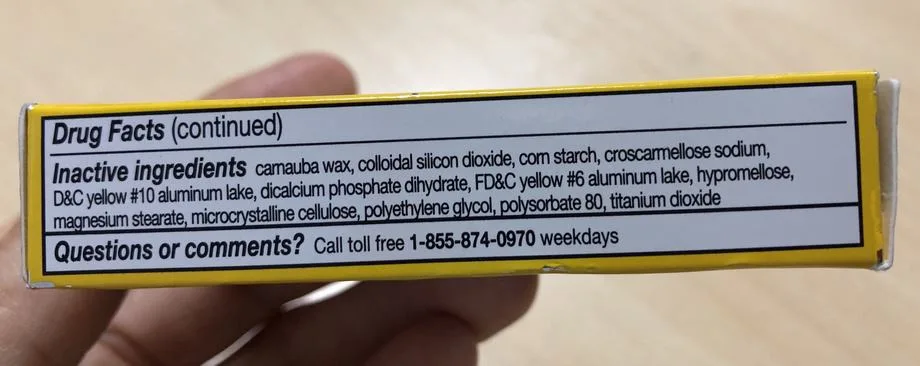
Alternatives to Caffeine Pills
Caffeine pills are a cheap option, but in my opinion, they don’t deliver on their promise of an effective energy boost. I prefer energy drinks or black coffee.
If you’re looking for some great energy drinks to try instead of caffeine pills, here’s a list of some flavours and brands that you should take a closer look at.
Ready-to-drink cans:
Energy drink powders:
- Zipfizz
- Advocare Spark
- G Fuel
- REIZE (10 out of 10)
These are some of the best energy drinks on the market, but there are plenty of others out there too if you do some research.
Of course, there are other caffeinated alternatives available too. Make it Mio by Kraft is just one of them to take a look at.
REIZE (10 out of 10)
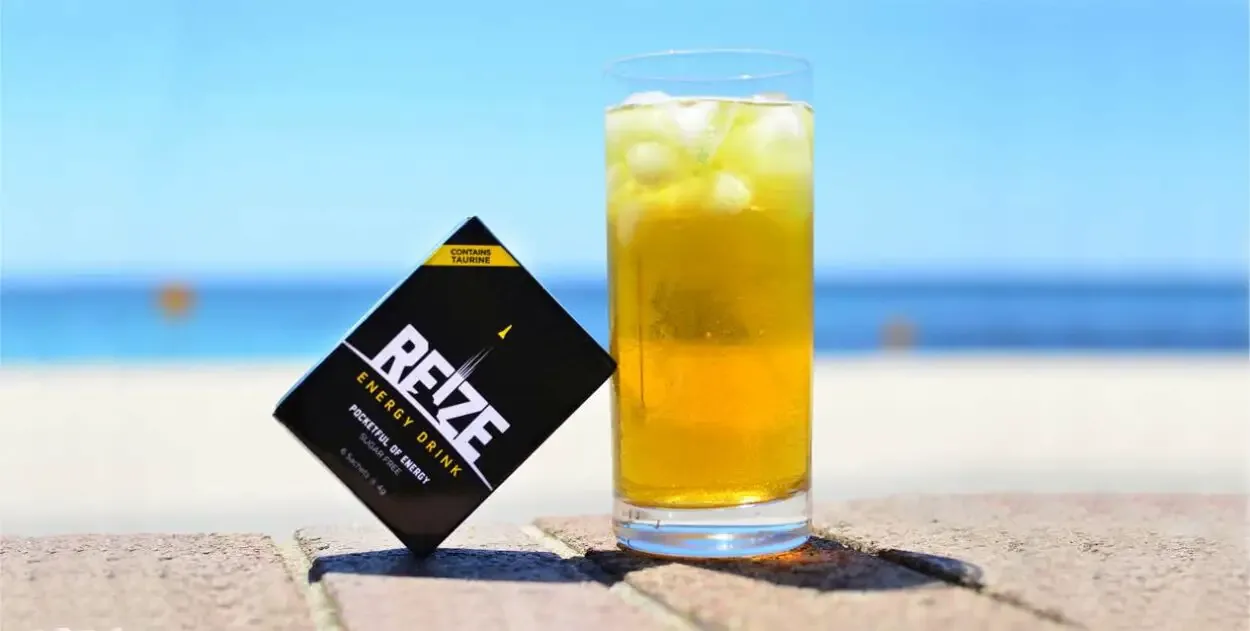
If you’re looking for an affordable energy boost that doesn’t disappoint, you might want to take a closer look at REIZE Energy Drink.
REIZE is a powder that you mix with water to make a delicious energy drink anytime you need a boost and it ships right to your door for around $1 per drink. It is infused with 50mg caffeine, 11 calories, taurine, ginseng, B vitamins, and zero sugars!
Indeed, a great alternative to caffeine pills!
Give REIZE a try today and you might just find that you prefer it to caffeine pills.

